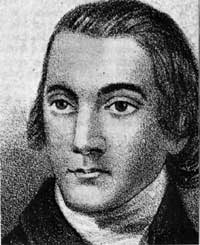Lyman Hall
| Lyman Hall | |
|---|---|
 |
|
| Governor of Georgia | |
|
In office January 8, 1783 – January 9 1784 |
|
| Preceded by | John Martin |
| Succeeded by | John Houstoun |
| Delegate from Georgia to the Continental Congress | |
|
In office 1775–1777 |
|
| Personal details | |
| Born | April 12, 1724 Wallingford, Connecticut |
| Died | October 19, 1790 (aged 66) Burke County, Georgia |
| Political party | Pro-Administration |
| Residence | America |
| Profession | Governor |
| Signature | |
Lyman Hall (April 12, 1724 – October 19, 1790), physician, clergyman, and statesman, was a signer of the United States Declaration of Independence as a representative of Georgia. Hall County is named after him.
Lyman Hall was the son of John and Mary (née Street) Hall and graduated from Yale College in 1747, a tradition his seven siblings would repeat. In 1749, he was called to the pulpit of Stratfield Parish (now Bridgeport, CT). His pastorate was a stormy one: an outspoken group of parishioners opposed his ordination; in 1751, he was dismissed after charges against his moral character which, according to one biography, "Were supported by proof and also by his own confession." He continued to preach for two more years, filling vacant pulpits, while he studied medicine and taught school.
In 1752, he married Abigail Burr of Fairfield, Connecticut, however, she died the following year. In 1757, he was married again to Mary Osborne. He migrated to South Carolina and established himself as a physician at Dorchester, South Carolina, near Charleston, a community settled by Congregationalist migrants from Dorchester, Massachusetts decades earlier. When these settlers moved to the Midway District – now Liberty County – in Georgia, Hall accompanied them. Hall soon became one of the leading citizens of the newly founded town, Sunbury.
On the eve of the American Revolution, St. John's Parish, in which Sunbury was located, was a hotbed of radical sentiment in a predominantly loyalist colony. Though Georgia was not initially represented in the First Continental Congress, through Hall's influence, the parish was persuaded to send a delegate – Hall himself – to Philadelphia, Pennsylvania, to the Second Continental Congress. He was admitted to a seat in Congress in 1775. He was one of the three Georgians to sign the Declaration of Independence, and one of three doctors to sign the Declaration of Independence.
...
Wikipedia
